#King Władysław I of Poland
Explore tagged Tumblr posts
Text
minigame XVIII
👑Matejko's princes and kings of Poland edition👑
Jadwiga banned once again bc cmon. I know you guys. but i prommy we will have a best Jadźka painting minigame at some point









again - my own selection. see all the other portraits here. portraits are in black&white because they are the og matejko drawings - the coloured versions some of you may know are the work of his students and that series is not complete anyway.
minigame suggested by @gniew7777
#minigame#polls#polska#poland#jan matejko#check out the other portraits cuz konrad mazowiecki is like kinda sexy. who said that
91 notes
·
View notes
Text
History Rant??
I love you wikipedia because what the fuck do you mean we don't exactly know how old Władysław II Jagiełło/Jogaila (Jadwiga of Poland's husband) was???

that's a ten year difference. Granted, Jadwiga doesn't give us a better date, giving two dates with a 4 months difference between them but at least that's better than a whole decade.
I'm just wondering how did that happen, because he came from what I assume is a aristocratic family (his father was a Grand Duke and his mother was the daughter of a King).
I'm also concerned because Jadwiga was born between 3 October 1373 and 18 February 1374, which means that at the very least Jogaila was a decade older than her. I guess it's not really strange when it comes to medieval/royal marriages but it still annoyes me that there is no clear date of birth.
I'm studying prehistoric archaeology so I shouldn't really complain about the fact that historians can't keep track of someone's date of birth but it still confuses me. Apperently Jogaila spent his youth on his father's estate so did he just appear one random day as a toddler or as a full grown 10 year old???
#jadwiga of poland#jogaila#Władysław II Jagiełło#Wladyslaw II Jagiello#polish history#lithuanian history#talking stuff
11 notes
·
View notes
Text

I found this on Twitter and…😭😭😭 i hate How much i see THE resemblance in the facial features
For those who dont know Władysław Jagieło was a King in Poland
17 notes
·
View notes
Note
Since you got so many postive reactions, I'll also add something Your story is boring. Its too long, its too complicated, the plot is too long, nothing happens, it's not RA at all any more, it has nothing to do with canon! Halt is a joke, there is nothing left of him. This is annoying, the whole story is annoying! Secondly, you dramatize the story too much. Why is Halt's mother a child when she gave birth to him? Don't you have enough angst from the plot, then you have to add such elements and make the king a pedo? A bit pathetic, if you ask me. Why is she so young? Why would Caitlyn be married so young? Nobody did that in the canon! Second, why, for God's sake, is everyone there gay? In the Middle Ages? What's that supposed to be? Third, you don't respect your own readers. You post new chapters without any rhythm, once every week, once every month, instead of sticking to any routine. People don't want to read something so inconsistent, it's stupid, it's annoying. Oh and all those references to Catholicism in the plot in and your made up religion. Is it really necessary?
It's a shame, because this could have been a really cool story… you still have a lot to learn, good luck!
Hello, I would say thanks for contacting, but then it would probably sound ironic. Well.
I understand that the pace of the story may not suit everyone, especially people who prefer short stories. However, I made it clear from the outset that the story would be long and complex. It's a whole AU and yes, I love worldbuilding and I won't apologise for that. I care about the details, but I also care about a balanced sinusoid of action. This isn't an action movie where you'll eat popcorn and laugh at the jokes, it's a marathon geared towards experiencing the story a little deeper. If it annoys you, I'm not sure why you don't just give up reading it…. you refer to the facts revealed in recent chapters, so you've at least made it to chapter 41, even though the story annoys you so much. Why? And why should it be my fault?
Let the numbers speak for me. Jadwiga Andegaweńska, King of Poland, married Władysław Jagiełło, Grand Duke of Lithuania, at the age of 12. He was 35 years old at the time. He took his last wife at the age of 70. She was named Zofia Holszańska, she was 17. Henry VIII of England took Catherine Howard as his wife when she was 17. He was 49. The youngest queen consort was Isabella of Valois, second wife of Richard II, aged 6 years 11 months and 25 days when she was married to him in 1396. The average age at which women were given in marriage in the Middle Ages was 12-14 years. It was only at the end of this era that this age changed to the late teens (16-19). The Renaissance brought a shift in this average to the early 20s. Yes, I am aware that we do not have such situations in the canon. Probably because the canon is a conglomeration of several different visions of the Middle Ages, which the author did not see fit to separate. Armaments, schooling, lack of illiteracy, developed medicine and finally, social realities all disagree. I am sorry to have to tell you this, but no princess married a plebeian knight because he was nice and she loved him. No princess ran around in the woods with a slingshot and none of them was likely to be allowed to become a super secret special task soldier because her parents couldn't cope with her upbringing. Canon has nothing to do with historical reality. In many ways it also misses the mark with my story. It's a fanfic. It's just a story, invented by me and loosely based on canon. It's AU - Alternative Universe. Where there's magic, religious wars and various things like that. But some of the stuff in there comes as a result of my fascination with history and the development of societies in different eras. Hence, certain phenomena, such as just the treatment of women, the age at which they were given in marriage, illiteracy, pestilence, economic dualism and sending children to war, appear in the storyline. Eileen is a monument to women, girls who were given in marriage to bear children to kings, to endure their outbursts of anger, beatings, rape and other forms of violence. Her story is very important to me and no, it is not there just to add drama. I'm sorry you see it that way.
Because we are human, we have always existed and we will always exist. Because it is a story written by a queer person and because as an author I can do so. I also pointed this out in the tags. Too many queer people reading books couldn't find themselves in the plot. I only write queer stories. And if in a story about blood magic, prophecies, human sacrifice, violence, wars and betrayals, you have the biggest problem to a few queer people in the plot, it's no longer my fault.
Listen, I'm really trying not to be mean. Let me say this as gently as I can. I'm not your friend. I'm a random stranger on the internet that you know nothing about. I'm not your school mate for you to talk to me like that. I'm an adult, I work full time, I'm writing my Master's thesis and I'm taking care of two children. I'm sorry that my few hours a week that I can spend doing something for myself, are not enough for me to write a 16-19k chapter once a week. How annoying and mean of me. Wow.
I wasn't inspired by Catholicism. But it's interesting that of all the world religions, this is the one that came to your mind. If you associate a fictional religion based on blood sacrificing, heroising self-harm and sacrificing children, cruelty to captives and hateful contempt for women with Catholicism, then who am I to argue.
It's been so much fun writing to you. And you don't offend me by saying I have a lot to learn. We all have. If one stops learning, one dies. And I still have a whole lot of queer, boring, annoying stories to write. Have a lovely day! And may your toilet seat be cold af at the middle of the night :)
#rangers apprentice#ranger's apprentice#rangers apprentice fanfiction#the iron song fic#queer pride#historical inaccuracies
12 notes
·
View notes
Text
Is this truly how I want to introduce myself?
Me: Casually explaining what I have planned to write in the current chapter of my fic.
My fiancé: In the next chapter Ciri should leap to the world of medieval Poland and meet king Władysław Jagiełło, have some adventures at his court. And Ulrich von Jungingen should be there too.
Me: Hmmm, that's an interesting concept. Noted.
My fiancé: And Ulrich von Jungingen should have two c*cks conjoined together, and they should fight each other with their c*cks.
Me, spluttering my drink onto the wall: It always ends up with c*cks, when it comes to you, doesn't it?
#the witcher#cirilla fiona elen riannon#fanfic#crack#hello tumblr#no regrets#crack fic#anecdotes#medieval history#first post
7 notes
·
View notes
Text
ROUND 2, MATCH 4
Admin's commentary: Battle of the Vladislavs let's gooo
***
WHAT MY PROFESSOR OF MEDIEVAL HISTORY SAID ABOUT THEM
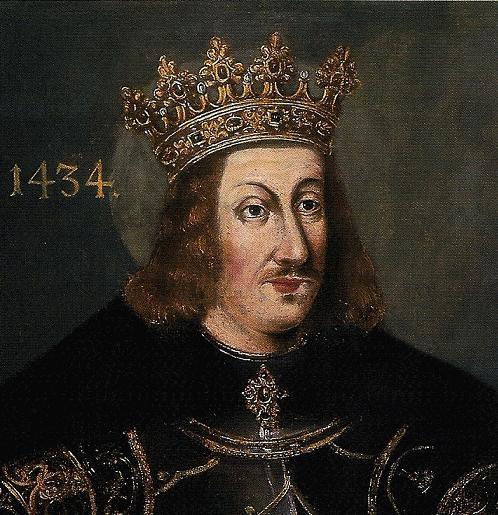
I.Ulázsló (Vladislav I.) 1440-1444
became king because the nobles justifiably didn't want to have a fucking fetus on the throne during war with Ottomans
said war with Ottomans being the battle of Varna. where he fucking died.
@rulers-of-poland-tournament said about him: "in Poland, Ulázsló, or Władysław Warneńczyk, has become an unofficial patron of the Polish LGBT+ community, regardless of whether the allegations of his homosexuality were true or not. aside from that, he is remembered as a hot-head and poor decision-maker"
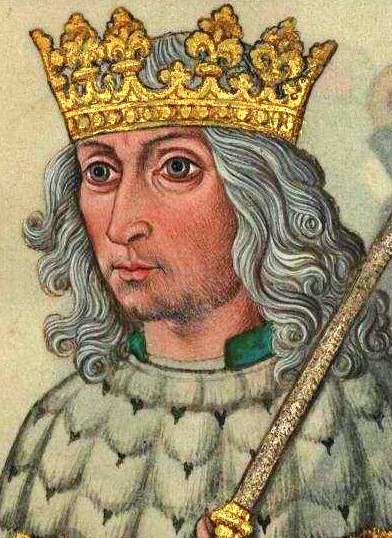
II.Ulászló (Vladislav II.) 1490-1516
I'll be honest, at this point we were at the end of the last lecture of the semester and trying to wrap shit up, our professor didn't say much about him as a person
rule of Jagiellonians in Hungary is generally remembered as a bad time, what with the continued Ottoman expansion, economic downturn and several uprisings
this dude in particular is remembered as "king Dobrze" (dobrze - "good" or "well" in Polish) for his habit of just agreeing to everything
at least he had the decency to pave the way to much more competent people by signing a treaty of succession with the Habsburgs, at the same time, he married Ferdinand I. to his daughter Anna, honestly the best decision this man has ever made
there's also some hillarious stuff with him marrying the widow of Matthias Corvinus and becoming a bigamist, but we didn't talk about that on our lectures
basically just a massive L of ruler, if this bracket was about the worst king of Hungary, he and II.András would square off in the finals
13 notes
·
View notes
Text

PL:
Pola Grunwaldu
15 lipca 1410 roku na polach pod Grunwaldem miała miejsce jedna z największych bitew w historii ��redniowiecznej Europy. Stoczona ona została pomiędzy siłami zakonu krzyżackiego, wspomaganego przez rycerstwo zachodnioeuropejskie (głównie z Czech, z wielu księstw śląskich, z Pomorza Zachodniego i z pozostałych państw Świętego Cesarstwa Rzymskiego) oraz Prusów pod dowództwem wielkiego mistrza Ulricha von Jungingena, a połączonymi siłami polskimi i litewskimi (złożonymi głównie z Polaków, Litwinów i Rusinów) oraz niewielkich wojsk tatarskich wspieranych lennikami obu tych krajów (Hospodarstwo Mołdawskie, księstwo mazowieckie, księstwo płockie, księstwo bełskie, Podole i litewskie lenna na Rusi) oraz najemnikami z Czech, Moraw i z księstw Śląska oraz uciekinierami ze Złotej Ordy i chorągwiami prywatnymi (między innymi chorągiew z Nowogrodu Wielkiego księcia Lingwena Semena), pod dowództwem króla Polski Władysława II Jagiełły i wielkiego księcia litewskiego Witolda.
Bitwa ta zakończyła się zwycięstwem wojsk polsko-litewskich, co miało ogromne znaczenie dla dalszych losów obu krajów.
EN:
Fields of Grunwald, Poland
On July 15, 1410, one of the largest battles in the history of medieval Europe took place in the fields near Grunwald. It was fought between the forces of the Teutonic Order, supported by Western European knights and the Prussians under the command of Grand Master Ulrich von Jungingen, against the combined Polish and Lithuanian forces along with a small contingent of Tatar troops supported by vassals from both countries as well as mercenaries from Bohemia, Moravia, and the Silesian duchies, and refugees from the Golden Horde and private banners under the command of King of Poland Władysław II Jagiełło and Grand Duke of Lithuania Vytautas.
The battle ended with a victory for the Polish-Lithuanian forces, which had a significant impact on the future of both countries.
#grunwald#pole#pola#pomnik#bitwa#walka#wojna#polska#litwa#krzyżacy#zakon krzyżacki#field#fields#fields of grunwald#monument#statue#memorial#battle#fight#war#poland#lithuania#teutonic order#teutonic knights#rycerze#knights
2 notes
·
View notes
Text
Who ordered the death of king Wenceslaus III?
It's early afternoon of August 4th 1306 in beautiful Olomouc, Margraviate of Moravia. The young Bohemian king Wenceslaus III is a guest of the bishop, who offered him his hospitality on king's campaign to Poland. Václav had recently resigned his position as the king of Hungary, but now he's determined to defend his hereditary claim to the Polish crown.
Wenceslaus had just finnished lunch and decided to rest in private chambers. Suddenly there's a scream and the guards catch Konrad of Mulhov (1), a German knight, with a bloodied blade just outside of king's chambers. The king lies inside, stabbed to death. His death means the end of the Přemyslids, who had ruled Bohemia for over 400 years.
Konrad is killed immediately. We have the name of the killer (unless of course he was being framed), but even 700 years later we don't know who paid for king Wenceslaus' death. Even sources of that time can't agree on the culprit.
Elizabeth of Töss - a Hungarian princess, the last member of the House of Árpád. She was betrothed to Wenceslaus once. A king of Hungary and heir to the Bohemian throne is quite the catch. But once Wenceslaus gave up the Hungarian crown, the engagement was terminated. After this Elizabeth never got married and spent the rest of her life in a closter. The loss of an advantageous marriage and feelings of being betrayed seem like enough of a motive. But did Elizabeth have good enough connections to get a murderer right into king's chambers?
Charles Robert of Anjou- Wenceslaus took the Hungarian crown (thanks to his fathers political machinations) under quite tumultuous circumstances. After the previous king of Hungary got murdered, Charles Robert of Anjou was Wenceslaus' main opponent in pursuit of the crown and Wenceslaus' success only fanned the flames of opposition. It would make sense for Charles to get rid of his greatest rival. However when Wenceslaus gave up the Hungarian crown, he did so in favor of Otto of Bavaria. Would Charles ignore this new threat and arrange the death of his former rival?
Albert I of Germany - the king of Holy Roman Empire. Not too long ago he waged war Wenceslaus' father to slow down his rise in power. And even though he and Wenceslaus had made peace, the king of Bohemia still has a lot of power in the Empire. Plus since Wenceslaus has no legitimate children, if he dies, Bohemia will fall right into Albert's lap. After all, a few months after Wneceslaus' death Albert attacked the Bohemian kingdom to claim it for his son Rudolph. But had he been the culprit, would he wait that long?
Władysław I Łokietek - he's not happy with the Přemyslids ruling over Poland and would in fact like to claim the Polish crown for himself. He'd been campaigning against them for the past two years and now that Wenceslaus is coming to Poland with an army, it might be time to strike. But could he get a murderer to Wenceslaus' court?
Henry of Carinthia - while Wenceslaus is leading his army to Poland, Henry is his regent back in Prague. Maybe he would like the royal power for himself? His marriage with Anne, the eldest of Wenceslaus' sisters would only help with that. We know the Bohemian nobility elected him king after Wenceslaus' death, so did he decide to speed up the process?
The Bohemian nobility - over the past century they'd gained quite a lot of power and amassed several reasons to be mad at the king. It could be revenge for the execution of Zavis of Falkenstein, one of their own (2). It could be a solution to proprietary disputes. It could be an attempt to help one of Wenceslaus' opponents. But if such conspiracy had happened, wouldn't we have found out by now?
(1) Some sources name him as Konrad of Botenstein, but for the purposes of this poll it doesn't really matter.
(2) To me this doesn't feel like a valid reason since it was Wenceslaus' father who ordered to execute Zavis, but it is what some sources claim.
#čumblr#polls#history#czech history#i don't even care if anyone votes the idea would haunt me until i made it#and yes i should be studying instead of this
63 notes
·
View notes
Text
How The World Was Made Boringly Efficient
I have already reposted several posts about history under the tag #history was written by the Victorians, about the misconceptions that entered the public consciousness during the early modern era (mostly the Victorian age, indeed) and refuse to leave. That and, I promised a post about the modern perception of government and public services that just can't line up with fantasy worlds and, even, the ideas of some historians.
It hit me when in @milkywayan's post about medieval food, the typical idea of which is heavily tainted by Victorian ideas that, unsurprisingly, came from then-contemporary poverty food. And I really don't want to sound like Ted Kaczynski, but: blame the industrial society for that. And capitalism.
There will be a lot of things in this post that I copied from an unfinished draft of mine tentatively titled "Writing Fantasy in the Information Age" - mostly because back then I focused on the modern times entirely too much and a lot of the issues come from earlier eras. This is a general disclaimer for the tangents that will appear further on.
For the King and... That's It
The medieval (and earlier) concept of government was heavily personal, and with a lot of independence involved. I do remember, for example, scenes from the Asterix comics where the Roman governors did as they pleased and as long as their duties towards Rome were fulfilled (for example, paying the set taxes and pocketing much more for personal gain) they were left unbothered. The same can be said about patriotism, or more precisely the loyalty to the ruler, because the concepts of patriotism and nation as we understand it are Enlightenment-era ideas. And when I'm saying it was personal, it was personal. For example, the entire clusterfuck that was 17th century Poland started with the overly inflated ambitions of Swedish Prince Sigismund Vasa, a fanatical Catholic (oh shit) elected the king of Poland. His fanaticism caused us no end of trouble and wasted opportunities - for example, in order to hold the Swedish throne after his father Johan III died, he had to be forced to sign religious liberties for the local Protestants and never really gave up ideas of Catholic reconquista of Sweden, leading the regent, Sigismund's uncle Karl IX to oust him and take the throne, which led to over half a century of violent dynastic shin-kicking as both sides tried to take over the other without much success. Mostly because Sigismund refused to allow his son, prince Władysław, to change his faith for political reasons - neither to secure the Swedish throne nor, after we thoroughly kicked a lot of Muscovite ass, the throne of Russia. Just fucking imagine: we forced the Russian tsar Vassily Shuysky to pay homage to king Sigismund and accept prince Władysław as the new tsar only for the king to go "lol, nope" and scuttle the whole plan. All that despite two centuries and a half of wide-ranging religious tolerance introduced by king Casimir the Great and reinforced by various acts throughout the reign of the Jagiellonian dynasty.
And since we're at the 17th century clusterfuck, there's the issue of Cossack ataman Bohdan Khmelnytsky, who caused us a lot of trouble because nobody gave a shit about his personal feud with noble Daniel Czapliński. Basically, Czapliński stole part of Khmelnytsky's land, Khmelnytsky filed complaints to everyone higher and higher up culminating in an audience with the king, and achieved fuck-all. Much like a lot of people trying to get any help from the Polish government ever since. Worse yet, he was given a lot of shit for being that old-school Ruthenian Orthodox Cossack with a stupid haircut, mostly from the local prince Jeremi Wiśniowiecki, who was as much of a Polish Catholic poser as he could be. So, unfortunately, Khmelnytsky made some hasty and truly weird alliances, started a war and lost it, much like a lot of neglected Cossack leaders before and after him. Neglected, you ask? Well, I told you it was personal: the local nobles weren't willing to accept the Cossack leaders as people of equal standing, for various reasons, and treated them like uppity peasants.
And as for filing complaints to the King, we don't have the greatest track record about that either - for example, @bizarrepotpourri cited an example from the 15th century chronicle of Jan Długosz, regarding robber knights in southern Poland, that apparently never saw a resolution, as the stories of supposed punishment have multiple contradicting versions that don't line up with any records and sound like a smear campaign orchestrated by a rival noble family that was unsuccessfully tempted into treason by the Hungarians.
So, don't be surprised by all the free-for-all fuckery that goes on in A Song of Ice and Fire, for example. GRRM, while being laughably inept in some fields and rude and unreasonable about others, nailed the ambitions and liberties medieval nobles had, the way kings had to rely on the nobles by bribing and threatening them when necessary, and not really giving a shit as long as the internal conflicts didn't threaten the Royal house. Also, back to the elevator pitch for this post, and the quote by historian David Sturdy, don't expect the peasants to feel much loyalty to the land or country - they obey their local noble, and the king just in case, but apart from that they'll focus on defending their heimat - mostly their village and some lands around it, and if dragged into a bigger conflict by their liege (whether on the orders of the king or because of some dick-measuring contest against the neighboring noble), they'll be fairly confused about the whole thing. Forget the enthusiastic cries of "For Temeria!" from The Witcher 3 and other nonsense like that. They're more likely to raise torches and pitchforks against unjust taxes and services forced on them.
Guards! Guards! ...Guards?
While the concept of a Guild of Thieves as some kind of organized crime in the fantasy city of your choice is farfetched, don't expect any serious police force either. The city guard was usually tasked with manning the city gates and towers, also for fire watch duties, and, as I read in a book fragment helpfully photographed by @jurian-is-cinnamon-roll, the enforcement of some decency laws fell directly on the local executioner - for example, a too deep cleavage could get you a whipping. The judiciary role was fulfilled mostly by the city's government (unless some Serious Shit happened, as that required the appeal to the next instance higher up) and, unsurprisingly, the guards were often used as the Group In Charge's personal enforcers as well, meaning they were widely disliked and corrupt as fuck. So, getting caught by the onlookers and dragged to the nearest guard in the name of public safety was as or even more likely than being seized by the conveniently close patrol.
Another very important issue related to the city guards is that there was no municipal lighting to speak of - as in, no street lights, meaning that after sunset, the whole city was pitch-ass dark and you had to bring your own lamps and/or hire servants (called link-boys) to do it for you. And even then, with understaffed and corrupt city guard, you risked getting robbed by gangs of thugs.
Out of the cities, it was even worse: with the traffic few and far between, because not really that many goods had to be shipped long way away, there was nobody to come to your aid on the long stretches of roads, particularly through uninhabited terrain like all the vast woodlands or bare, rocky areas. Typical robbers weren't the Merry Men of Sherwood, but brutal thugs if not outright homicidal maniacs. Sometimes even minor nobles, particularly in German states, supplemented the income from their fiefs by ambushing trade caravans, at least until they became too much of a nuisance and had, for a lack of a better word, a posse sent after them. Then, there were pirates - while a lot of the current pop culture focuses on the late 17th-early 18th "Golden Age of Piracy" on the Atlantic, there are also the earlier North Sea pirates preying on the Hanseatic ships in the 14th century and Barbary Pirates operating on the Mediterranean Sea for over a millenium - from the 8th to the 19th century.
Million Ways to Die in the Medieval Times, A Lot of Them Embarrassing
I once said jokingly that “in Bismarck’s time, they made a lot of babies in the countryside because they wore out quickly”, a reference to many infant and child deaths that unsurprisingly skewed the statistics and led to the “barely anyone lived past 30 in the Middle Ages” myth. Sure, there’s five centuries between Middle Ages and the Iron Chancellor, but as opposed to other things mentioned before, we had to wait for the important changes in the field of medicine all the way to late 20th century. Here's a page from a 17th century document listing the number of deaths in London, 1632 AD.
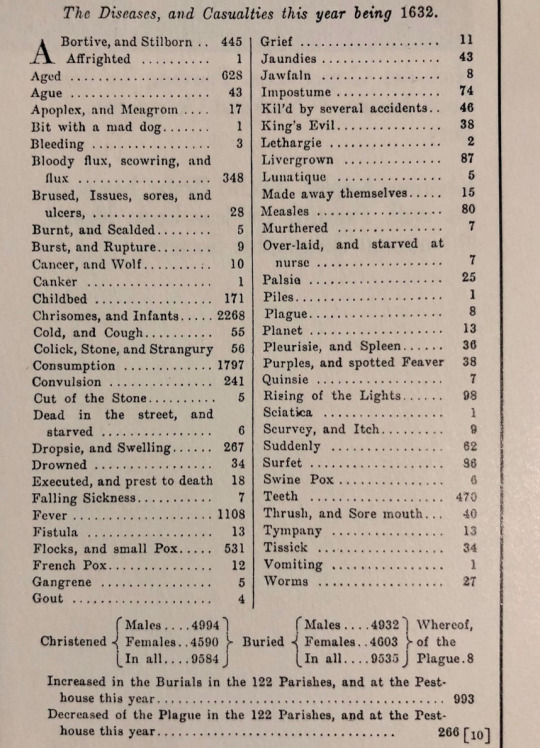
So, what was I saying about "making a lot of babies because they wore out quickly"? Over two thousand dead babies that year in London alone, not counting stillborn ones. Almost 1800 cases of tuberculosis, an illness pretty much unheard of in the modern world because we vaccinated the ever-coughing shit out of it. Over a thousand cases of fever, over half a thousand cases of pox and almost as many deaths by the notoriously neglected British teeth (read: abscesses, infections, inflammations, etcetera). In a city of about 250 thousand inhabitants.
Of course, any medical help was entirely private, small-scale and fully paid for by the patient - be it actual physicians, resident or itinerant barbers, herbalists or whoever had any medical knowledge or at least conviction of it. There was also a lot of mad science and outright quackery going on, not to mention treason - I do recall a case where the court physician of a Pomeranian duke was executed because somehow, strangely, the duchess' every pregnancy ended in stillbirth - until it was found out that he conspired with the neighboring state (I can't remember whether it was Denmark or one of the German states that had their distinct identities back then) to prevent the duke from siring a legitimate heir.
There were also no hospitals to speak of - what was called a "hospital" was, in fact, an almshouse - part asylum, part housing for the poor and elderly who had to express their gratitude by praying daily for the almshouse's founder good health and fortune. This also means that monks running those places didn't necessarily have any medical knowledge to speak of.
And since we're at embarrassing deaths, let's go back to the previous sections that regarded justice and law enforcement. You're probably thinking that in the Middle Ages, the lawmakers were going out of their way to have people hanged for just about anything and, well... that's bullshit. Not quite Victorian bullshit, as the stereotypical harsh law dubbed the "Bloody Code" was introduced during the reign of king George III - you know, the crazy one - although it has been entirely the doing of the British parliamentarians taking it out on the poor, as they're wont to do even now. While earlier penal codes like the Holy Roman Empire's Constitutio Criminalis Carolina did warrant the death penalty for grand theft, they also defined fairly high value of the stolen items - if I remember correctly, one golden ducat. The Bloody Code, however, aimed at a value about twenty times lower, and that would be 12 pence, or one shilling. Even with over two centuries of gradual depreciation of coin, that value was bubkes, and so the juries often undervalued the stolen goods, as not to hang everyone dragged before the court. For example, a sheep that was worth six shillings could be valued at ten pence, just so the thief could be hauled off to Australia instead and get pressed to work there. And while I know that other Tumblr users know the subject better than me, I learned long ago that being hanged was indeed embarrassing, certainly much more than having your head chopped off in public.
But, a lot of punishments weren't meant to be an embarrassing death or even maiming - if you ever saw the device known as the stocks, that one was meant mostly for embarrassment. Not only you had to be locked in them for several days, but also everyone around knew you and could give you a couple of harsh words or rotten produce. So your reputation was most probably dragged through the worst kind of shit by that, and if you kept going at it, you could be chased out of the area with the promise of a very embarrassing death if you returned, or just skip that and die a very embarrassing death. There were also other creative devices that made your life hard and made you look stupid, but I think I should leave that for some other time.
Mostly Rural and All-Natural
Now, let's focus on the post that started it all: the food. The Victorian age is well past the time when the majority of people started moving to cities, meaning that a lot of stuff had price tags and not many people could actually grow their own food. The Middle Ages, well, they were mostly rural and all-natural, like the title of this section says. This meant that, as the post about the food mentioned, people not only had a well-rounded diet that included eggs, milk and cheese, but also a large variety of vegetables and herbs, plus a lot of stuff found or caught in the wild - now, while venison and boar were the meat of kings and you would be royally fucked up for poaching those, nobody was particularly bothered about hares, for example. Also, when it came to clothing, homespun wool and linen were common materials and they could be dyed using various plants growing in the wild. The little display I linked should give you an idea of what was possible - and what, unsurprisingly, people refuse to acknowledge due to historical misconceptions.
This, of course, doesn't cover a lot of sumptuary laws that were common through history (and moreso in the Far East, particularly Japan). For example, the Ancient Romans had strict regulations as to who was allowed to wear silk clothing and clothing that was dyed purple, and multiple sumptuary laws in medieval Europe regulated the permission to wear certain furs, most importantly ermine that is now archetypical of royalty, and the amount of precious metals. So don't be surprised at the story I mentioned in the post about medieval executioners: I'm guessing that sumptuary laws were the reason why the infamously flamboyant clothes of a corrupt guildmaster were off-limits to the executioner who would be permitted to take them otherwise.
And Then What?
Okay, let's finish this. What's the deal with "boringly efficient" of the title? Well, for starters: the urbanization, industrialization and flight to cities that led to the simplification and unification of clothing, food etc. through large-scale production. That moved the burden of making clothes or growing food from single families to large enterprises, but also changed the whole structure of people's diets due to logistics. Our vegetables aren't the medieval vegetables, our dairy is not the medieval dairy and most importantly, our meat isn't the medieval meat, for better (no parasites like tapeworms) or worse (being pumped full of veterinary medicine, water and salts, for example). We also have access to incomparably more fabrics and dyes due to the progress of chemistry and textile industry. But still, those things are produced elsewhere, by someone else, and most of us just have to buy the same standard stuff from the store instead of creating bespoke outfits or at least hiring someone skilled to do it. Boring, right?
While luxury imports were well known since the ancient times, the formation of trading companies that at one point could rival governments and noble houses in their power did increase the range and volume of imports, and colonization of far-off regions also added a thing or two to that. And with the increase of volume, the prices tend to drop, so a lot of extraordinary stuff like all the exotic spices, now being grown in large-scale plantations, became boring. I mean, I can have cinnamon any day now - a lot of medieval nobles would die of bloody flux at the sight of such impertinent flamboyance.
Then, there's politics and sociology running forward full-blast ever since the late 18th century. The Enlightenment redefined a lot of fundamentals, like the concept of a nation divorced (or sometimes widowed) from the reigning monarch and his lineage. The necessity to include first the bourgeoisie and later even the peasants' representation in the government also required surveillance and maintaining order among them instead of just, well, keeping them around and sending the troops to beat the shit out of them if they became unruly. Hence the development of modern police forces, intelligence agencies and, on the other hand, social services to make sure the poor aren't wallowing in desperation and lawlessness (mostly). So most of the time, everything is peaceful and boring. Of course, there's still exploitation going on, but fortunately nowhere near the scale that caused large-scale uprisings in the medieval times (unless some government spectacularly fucks up and causes nationwide riots, which happened even in post-WW2 Europe) - mostly because of the necessity of representation I mentioned above.
Also, governments need people alive and working to pay taxes and, sometimes, wage wars. So they can't just ignore epidemics, dishonest food companies causing mass food poisoning by cutting costs, etcetera. Hence the rapid progress of medicine and incomparably more chill approach to law and its enforcement (mostly). Hard to believe the Medieval times were way crazier, right?
#history#History was written by the Victorians#Mike's Musings#TLDR#long reads#long post#LONGPOST IS LOOONG
3 notes
·
View notes
Text
My time has come :D
@scenerwiththegreenery (I'm not sure if it worked before, sorry) let me tag you, because I don't think you'll get a notification from reblog of the reblog. My credentials for this are, I'm Polish, I ecceled in history in high school and it's been less than 5 years since I've finished it, so knowledge is still fresh in my mind and I still can fact check with my textbook
Before anything else I want to say, that person above me wasn't wrong, it's all true, but the issue runs a bit deeper.
TL:DR: Germany and Russia or their "ancestor" countries (idk how to call it otherwise, I mean for example Prussia or First Reich) are two consistent enemies throughout all of over 1000 years of Polish history. And sure, we had other enemies, we had Kingdom of Bohemia ("ancestor" of Czech Republic) from time to time in Middle Ages, we had Turkiye in 15th to 17th century and Sweden in 17th, but Germany and Russia stayed quite consistently from 10th century to 20th and let's be honest, nobody gives that much of a shit about stuff that happened before 19th century and these two were big part of Polish history in 19th and 20th century, when they took Polish independence and actually tried to erase our ethnic identity/just straight up kill us.
(and also, there is really nice and I think quite popular angdote about what Turkiye's stance on Poland in 19th century that warms their image a bit)
But, to elaborate, though I'll still be only brushing the surface, feel free to ask for clarification/about more info about anything. What is considered as a first battle in Polish history is battle of Cedynia, 972 A.D. with German margrave Hodon. Wait, no, scratch that, first Polish historical ruler, founder of first unified Polish state, married Bohemian princess Dobrawa and got baptised along with his country (966 A.D.) from her country's hands for the expressed purpose of not letting German's do it by force and to get rid of one of their main "reasons" to attack which was "spreading one and only correct Christanity". Conflicts with Rus, ancestor country for both Ukraine and Russia started around the same time, though I think it was more warranted (I mean, I think it started with conflict for territories). But throughout the Middle Ages, it was either one of them or both (or Bohemia) that was at war with Poland.
Later, somewhen in 13th century Holy Roman Empire (Germany) was kinda replaced in it by... Teutonic Order, which full name is Order of Brothers of the German House of Saint Mary in Jerusalem, also known as Knights of the Cross, which is a name I'll be using going forward, because it's the one most similar to what we call them in Poland (Krzyżacy, singular being Krzyżak, from word "krzyż" meaning cross. If you want to raw translate this name, it's probably "cross guys"). Anyway, they first showed up in Jerusalem during crusades but then when they failed there, they decided to kill people of other faith closer to home and after being called to help with pagan Prussians that were attacking territories of one of the Polish dukes (Poland was separated into smaller countries that were only kinda tied to each other in 1138, but it's not the time to talk about that), they did help, and then forged some important documents and set up wholeass country in what is now norhtern Poland, Kaliningrad, part of Lithuania, Latvia and Estonia (not from the get go, but they reached that size). To keep it short, second Polish ruling family, Jagielonian dynasty, was more or less definied by their wars with Knights of the Cross, with first one, Władysław Jagiełło, Grand Duke of Lithuania, even becoming Polish king because both Poland and Lithuania needed an ally in war with the Order. Because of Knights of the Cross Lithuania got baptised (from Polish hand). Most famous battle in our history, battle of Grunwald, was in war with Order (also, check out Matejko's painting under this name, it's absolutely amazing. Actually, just check out Matejko, he's a legend). Two last kings of this dynasty, Sigmund I Old and Sigmund II August, are considered good kings among all else, because they finally got rid of Knights of the Cross, though many think they should've done it differently, because what was left of the Order later became Prussia, which .
Also, SIgmund II August turned Polish-Lithuanian union from, and here please correct me if I translated the terms wrong, personal, menaing one ruler two countries, to real, meaning that Poland and Lithuania became one country, known as Polish-Lithanian Commonwelth (in Polish it's Rzeczpospolita Obojga Narodów, which can be translated as Republic of Both Nations). And you know what pushed Lithuanian nobility to agree to it? Russia (and I think they wanted to sell stuff in Poland without border tax whatever it's called in English, since for sure it's not "cło")
Unfortunatelly, Sigmund II died without son or younger brother so Polish and Lithuanian nobility, especially Parliament, made out of Sejm and Senat, was at loss in regard of who should be a king. In the end they decided it should be elected position (before anyone comes at me, yes, I know Jagiellonians were elected too, but they were elected from the same family because they were ruling family, and after Sigmund's death whoever wanted could become the king, if they were of noble blood and won "unanimous" election). Anyway, throughout this period (so from middle of 16th century up to year 1795) it was on and off with Russia, with addition of Sweden and Turkiye (no really, when I've been writing an essay about Polish-Lithuanian foreign policy in first half of 17th century, it was Sweden, Turkiye, Russia, Turkiye, Sweden, Russia, oh, now they're attacking simultaneously) and German nobility was always up as candidates in election, with two of them trying to usurp the throne with use of army when they lost. First one lost, second one won, which was probably symptomatic of Commonwealth's fall as a country, but again, it's much bigger issue I don't have time to go into.
Anyway, through power of politics, money and use of weaknesses of Commonwealth political system (fuck liberum veto) they, though mostly Russia, managed to weaken it and made it they're vassal to the point, where in 1772, 1793 and 1795 with Austria in first and last one, they just yoinked big parts of our territories, and at last, took our independece (in Polish history, this is called "rozbiory" in English partitions. Time between last partition and 1918, when Poland regained independence is called "zabory") and frankly here is where whole beef really starts.
Because, a) they took our independence, I think it's pretty good reason to don't like them, but what's more important, b) they started to try to erase our ethnic and cultural identity. The b) point is why we don't have such big beef with Austria. In Austrian part, Polish language was used in administration, Polish culture was allowed to flourish, there were Polish representatives in Austro-Hungarian parliament. And of course, it wasn't perfect, there is that time when they tricked Polish peasants into ruthlessly murdering local nobility, and this region generaly was kinda forgotten by capital and poor as chuch mouse, but at least they were allowed to be Polish.
At the same time, 19th century is the time, when both in Prussian, later German part of what used to be Commonwealth, and in Russian part seprated into so called autonomy of Kingdom of Poland and on territiories that were sucked into Russia, Polish ethnic identity, history and culture was prosecuted in more or less subtle ways. There are many stories of people send to Syberia (which was kinda to Russia what Australia was to British Empire, just really cold) because they were reading Polish books, or fighting in uprisings. And yes, Kingdom of Poland had a constitution that had many neat things written in it but every one who mattered had it so far up they're ass they could spit random paraghraphs. In schools, even in Kingdom, Russian was main language and lessons of Polish were a thing but they were facultative and during really inconvinient hours, usually with a teacher who knew they couldn't make it too engaging. In Prussia it was also forbidden to learn in Polish, with exception of Religious Education (there was famous protest of children in Września when they tried to take that away). Prussian government was also really forcefully repressing Poles in general, making it harder for them to compete with Prussian buisness or even build a house on their property (Drzymała, the ultimate player, started living in the wagon and moved it a bit every day, so the ban couldn't be applied (it was worded in a way, that meant immobile real estate and since his wagon was mobile... They got him anyway, through some creative use of law).
Anyway, it was a bad time, and I think we would be right to hold grudge even without the absolute tragedy that was WWII and communist reign later, but it happened. So, Poland regained independence in 1918, in 1920 we were already at war with communist Russia, that was won through power of "fuck you we just got our independence, we won't give it away", strategic genius of Polish army commander and Stalin's pride. Then it was kinda chill until 1939, which was good, because we had like... five different laws about trade I think (sorry, I've been writing this post for three hours, I can't be bothered to check right now) and two different sizes of train tracks and bunch of other stuff that needed to be taken care of, even without Great Depression and authoritarianism.
And then there was WWII, during which Poland lost biggest amout of people, when compared to the size, and most of them were civilians because a) before war around 30% of population was fromethnic minorities and biggest one were Jews, b) Slavic people were only slightly "better" in eyes of nazi's than Jews c) Soviets were also killing or exiling to Siberia a lot of people. And I mean, a lot. When Hitler attacked, only from men who were exiled Stalin managed to form 2 armies, and it's even without dozen thousand of Polish army and police officers, who were murdered in 1939-40. And they were murdered, because there is something called the law of war (geneva conventions for example) and according to it, prisoners of war are supposed to be kept alive and relatively well, and they were prisoners of war. And they were shot in the back of their heads and buried in mass graves, sometimes with some substances that were supposed to make body unidentifiable.
Also, in Poland we have the most of concentration camps because here lived the most of people that were supposed to be killed, the food rations that Poles were legally allowed to eat were downward starvation rations, you could never tell, when going down the street you could be shot or taken away to concentration camp just because, nazi's destroyed around 80% of Warsaw (Polish capital) urban fabric and according to Hitler's order stone on the stone was not supposed to be left and so on and so on. Also, they stole a lot of great pieces of art and suff and we're still searching for some of them, but really, it's pretty minor in comprasion.
From my family history, only from my one grandma I have both relative killed by Soviets, for simple sin of working in City Hall, and relative killed by nazis (my great grandpa)
And then after the WWII USSR came to "liberate" us, which was really from bad to worse, and involved great population displacement and we only managed to get rid of them in 1989, and sorry, I won't elaborate right now, because it's still too close and too much of a lived experience to many, including my parents and I can't promise I won't get a bit too aggressive about it
So yeah, asking if Poland is closer to Germany or Russia is really, really insensitive and fucked up and don't do it please. It's esecially asking which of our oppressors are we closer to and it's just... no. But asking if were closer to Czech or Lithuania could be funny and interesting conversation actually (unless Lithuanians would get mad about that, I heard they don't like us Poles all that much)
Just saw on Quora a guy asking if Poland was more German or Russian and every reply was a Polish guy detailing the ways they wanted to kill him
#polish history#i had other plans for today but well#fate (my mutual or tumblr for you page I'm not sure) had other plans#I'm more than willing to answer all questions about it; if they're asked respectfully#have a nice day dear stranger who got to this part
28K notes
·
View notes
Text
al things considered — when i post my masterpiece #1386

first posted in facebook january 19, 2025
józef simmler -- "queen jadwiga's oath" (1842)
"[in the year 1386], grand duke of lithuania jogaila (having been baptised on february 15 in wawel cathedral, kraków, and on february 18 married jadwiga, 12-year-old queen regnant of poland) is crowned władysław II jagiełło, king of poland, beginning the jagiellonian dynasty" … wikipedia
"a movie without at least one live music performance is like a pope without artificial teeth? … aki kaurismäki
"it appears that 1386 was quite a year in poland … not only was a 12 year old child crowned the country's first woman monarch (and you think WE might have problems on january 20th?!?!?), but judging by her husband's name, he might be a distant relative (or the namesake?) of the legendary polka musician li'l wally jagiełło" … al janik
#józef simmler#queen jadwiga's oath#1386#wikipedia#kraków#grand duke of lithuania jogaila#władysław II jagiełło#aki kaurismäki#a pope#artificial teeth#li'l wally jagiełło#polka#al things considered
0 notes
Text
Events 11.10 (before 1950)
474 – Emperor Leo II dies after a reign of ten months. He is succeeded by his father Zeno, who becomes sole ruler of the Byzantine Empire. 937 – Ten Kingdoms: Li Bian usurps the throne and deposes Emperor Yang Pu. The Wu State is replaced by Li (now called "Xu Zhigao"), who becomes the first ruler of Southern Tang. 1202 – Fourth Crusade: Despite letters from Pope Innocent III forbidding it and threatening excommunication, Catholic crusaders begin a siege of Zara (now Zadar, Croatia). 1293 – Raden Wijaya is crowned as the first monarch of Majapahit kingdom of Java, taking the throne name Kertarajasa Jayawardhana. 1444 – Battle of Varna: The crusading forces of King Władysław III of Poland (aka Ulaszlo I of Hungary and Władysław III of Varna) are defeated by the Turks under Sultan Murad II and Władysław is killed. 1599 – Åbo Bloodbath: Fourteen noblemen who opposed Duke Charles are decapitated in the Old Great Square of Turku (Swedish: Åbo) for their involvement in the War against Sigismund. 1659 – Chattrapati Shivaji Maharaj, Maratha King kills Afzal Khan, Adilshahi in the battle popularly known as Battle of Pratapgarh. 1674 – Third Anglo-Dutch War: As provided in the Treaty of Westminster, Netherlands cedes New Netherland to England. 1702 – English colonists under the command of James Moore besiege Spanish St. Augustine during Queen Anne's War. 1766 – The last colonial governor of New Jersey, William Franklin, signs the charter of Queen's College (later renamed Rutgers University). 1775 – The United States Marine Corps is founded at Tun Tavern in Philadelphia by Samuel Nicholas. 1793 – A Goddess of Reason is proclaimed by the French Convention at the suggestion of Pierre Gaspard Chaumette. 1821 – Cry of Independence by Rufina Alfaro at La Villa de Los Santos, Panama setting into motion a revolt which led to Panama's independence from Spain and to it immediately becoming part of Colombia. 1847 – The passenger ship Stephen Whitney is wrecked in thick fog off the southern coast of Ireland, killing 92 of the 110 on board. The disaster results in the construction of the Fastnet Rock lighthouse. 1865 – Major Henry Wirz, the superintendent of a prison camp in Andersonville, Georgia, is hanged, becoming one of only three American Civil War soldiers executed for war crimes. 1871 – Henry Morton Stanley locates missing explorer and missionary, David Livingstone in Ujiji, near Lake Tanganyika, famously greeting him with the words, "Dr. Livingstone, I presume?" 1898 – Beginning of the Wilmington insurrection of 1898, the only instance of a municipal government being overthrown in United States history. 1910 – The date of Thomas A. Davis' opening of the San Diego Army and Navy Academy, although the official founding date is November 23, 1910. 1918 – The Western Union Cable Office in North Sydney, Nova Scotia, receives a top-secret coded message from Europe (that would be sent to Ottawa and Washington, D.C.) that said on November 11, 1918, all fighting would cease on land, sea and in the air. 1939 – Finnish author F. E. Sillanpää is awarded the Nobel Prize in Literature. 1940 – The 1940 Vrancea earthquake strikes Romania killing an estimated 1,000 and injuring approximately 4,000 more. 1942 – World War II: Germany invades Vichy France following French Admiral François Darlan's agreement to an armistice with the Allies in North Africa. 1944 – The ammunition ship USS Mount Hood explodes at Seeadler Harbour, Manus, Admiralty Islands, killing at least 432 and wounding 371. 1945 – Heavy fighting in Surabaya between Indonesian nationalists and returning colonialists after World War II, today celebrated as Heroes' Day (Hari Pahlawan). 1946 – A magnitude 6.9 earthquake in the Peruvian Andes mountains kills at least 1,400 people.
0 notes
Text
Day 1 / 90
I've decided to try and rehearse my failing Polish by reading children's stories and compiling word lists from them. I'll be trying to learn the words like in this 90 day vocab challenge!
I am starting with Wierusz i Nikt by Paweł Wakuła. The first words are very likely to be word-for-word from the first sentences of the book, but I'm hoping that as I learn, there will be longer sentences as well.
So, here's my 12 words of the day! I've also added the sentence they are from.
Za = behind (prep.)
Panowanie = reign (n.)
Młody = young
Król = king (m. animate)
Czas = time (m. inanimate)
Niespokojny = troubled
A = and
Granica = border (f.)
Wciąż = still (adverb)
Stać = to stand (-> "to be on fire" with w ogniu)
Ogień = fire (m. inanimate)
Przez = through, across (prep. +acc)
Za panowania (s.gen) młodego (s.gen) króla (s.gen) Władysława Jagiellończyka czasy (pl.) były (past. 3rd.pl.nonvirile) niespokojne (pl.) a granica Królestwa Polskiego wciąż stała (past. 3rd.s.f) w ogniu (s.locative).
Under the reign of young king Władysław Jagiellończyk, times were turbulent and the border of the Kingdom of Poland was still on fire.
Will I need all of these words in my learning? Nope. Will it be fun? Yes! Now to declinate and conjugate the words in a separate file...
1 note
·
View note
Text
Zawisza The Black inspired by Fate/GO universe

quick sketches to give me an idea of the character
Zawisza is read as Zaveesha In Polish there's a saying that goes along the lines of: 'You can always count on someone like you can count on Zawisza' ('Można polegać na kimś jak na Zawiszy'), we still use it to describe someone who's really dependable. In Warsaw (and I'd assume other cities as well), there's a big roundabout bearing his name as well. I used to drive by it every day to get to my various University classes and ended up pondering what kind of person Zawisza was.
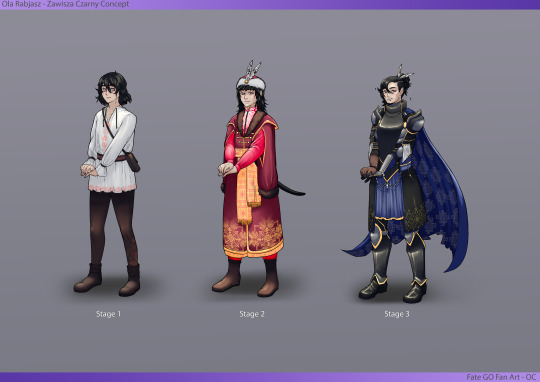
Stages 1 to 3 concepts - swords removed from hands to show full front of the character
He lived during the twilight of the Medieval era in Poland and took parts in various battles, a famed knight that never backed down on his words. One of the most famous battles he took part in was the Battle of Grunwald (The First Battle of Tannenberg) in 1410 AD. While there is no concrete evidence, it is said that Zawisza has saved the king's flag in the crucial moments of said battle. He was named 'Black' after his famous black armor that he proudly wore to battles. Some also say that he may have been named 'Black' after his hair. I prefer the first interpretation! 1st stage - Young Zawisza, a happy-go-lucky lad. He's wearing just a shirt and some trousers - adventure is way more imporant than looks at this time for him! From the flea market, ending at churches and courts, you can find this lad causing trouble for the troublemakers. A kid with a strong sense of justice, if you needed help, you knew he'd be there for you. 2nd stage - Young Adult Zawisza, he's gathered some experiences and has learnt how to carry himself in the court of the public eye, but nobody said he has to be very serious while doing so. A young man who knows when to be serious and when he can let loose. Not very interested in public meetings, he still fulfills his role with upmost care. His attitude towards life and people hasn't changed much - he's still a just lad at heart, who refuses to see people in need cry. His experiences have given his outlook more depth, while the world may be an unjust and cold place at times, he made it his life mission to change it for the better for people he cherishes, one person at a time. 3rd stage - Adult Zawisza, a man of the legend (and history!). Bearing his famous black armour and dark blue cape (based on Matejko's Bitwa pod Grunwaldem painting) he's ready to join the fray. A fair man whose smile steals people's hearts, this knight always keeps his promises. His prescence feels like a fresh breeze blowing, he's simply a joy to be around. Idealistic to a fault, which lead to his death. A diplomat, king Władysław Jagiełło's trusted confedants, he was a man of many titles and friends across various countries.
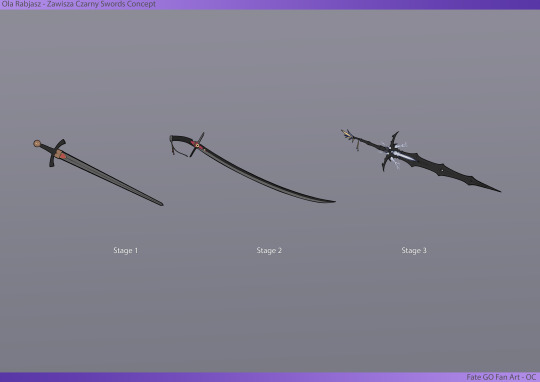
Stages 1 - 3 swords concepts - first one is a traditional polish sword, second one is a polish-inspired sabre, and third one is more fantasy-based sword that uses magic along with user's physical prowess
These connections eventually led to his death - during a battle with the Ottoman Turks, Zawisza's group was protecting the rear of hungarian army - King's army has been defeated and had to retreat. Zawisza was a man of great importance to King Sigismund of Luxembourg, so the knight has been sent a boat to safely reatreat. Seeing as his mission hasn't been completed, Zawisza refused and ended up being held hostage by the Ottoman Turks. It's said that Zawisza died because two of the Ottoman soldiers were fighting between each other about whose hostage he actually is - one of the soldiers in fit of rage cut off Zawisza's head. Historians also say that the reason of Zawisza's death was King Sigismund's bad strategy skills. His ideals lead to his death but he wouldn't have changed a thing, instead wishing to live a new life in a modern world to experience it once again - to taste the food, to see people smile, to be able to smile himself once again.

Patterns from stages 1-3
I had lots of trouble coming up with his Noble Phantasm, but in the end I decided he'd have two instead of one! 1st NP: A man you can count on - a cheery smile that shines through the darkness This Noble Phantasm is the essence of Zawisza's character and ideals - the less HP he has, the more HP he heals. If his HP falls below 20%, he fully heals himself and the team, while also giving them various buffs, removing all debuffs, and slightly charging their NP bar. If his HP is between 20% to 50%, he heals half of his team's HP, removes the debuffs, and slightly charges their NP. If his HP is between 50% and 100%, he cannot use this NP. Using this NP would be risky, as the Player would have to keep Zawisza on relatively low HP, risking his death. High risk, high reward. This NP's type would be ARTS. 2nd NP: Bitwa pod Grunwaldem - a saviour admist chaos An AOE Buster-type NP that would deal massive dmg while ignoring all defence buffs (like invulnerability) - could also get bonusses from the missing % of Zawisza's life. This is a shout out to Zawisza's role during Bitwa pod Grunwaldem - I imagine he had to cut through many enemies just to be able to get to the king's flag and save it (having the banner stolen meant that you lost). He was a brave man, quick on his fit, with a charming smile inspiring his comrades.
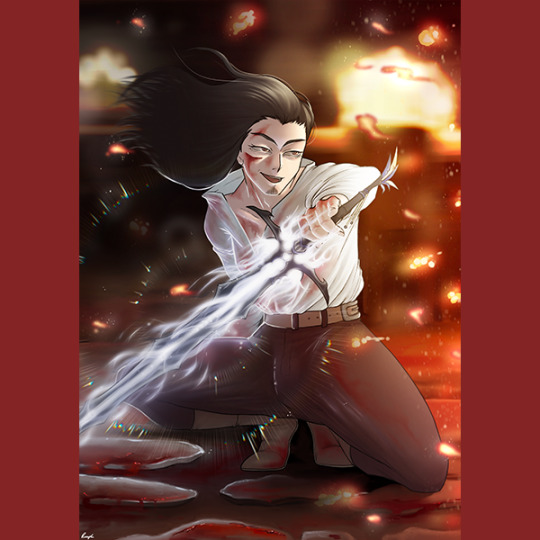
Zawisza's final art
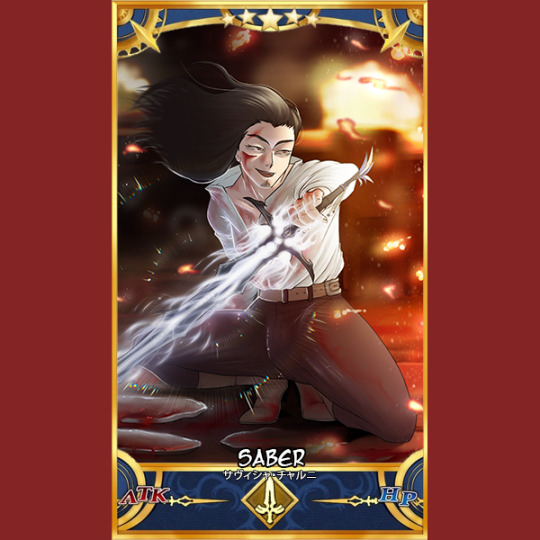
Zawisza's final art with servant border

90s anime inspirted picture of Zawisza
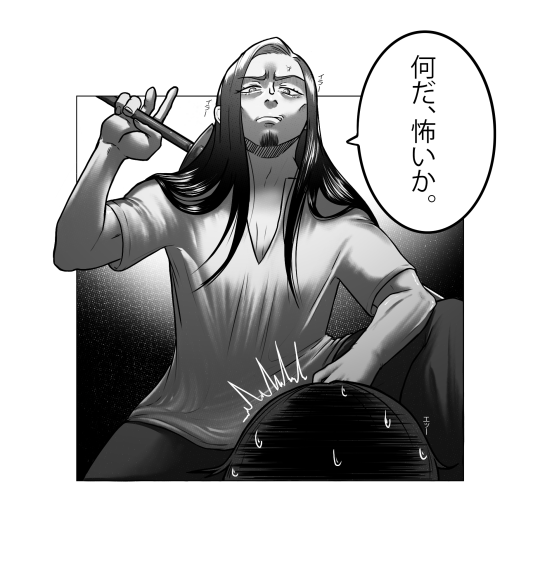
manga inspired picture of Zawisza

a quick sketch of Zawisza

Zawisza in different styles

Zawisza smiling
0 notes
Photo

PL:
Jaskinia Łokietka, Ojców
Znajduje się ok. 125 m nad dnem Doliny Sąspowskiej, jest największą spośród wszystkich znanych na terenie Parku jaskiń. Jej długość wynosi 320 m, a deniwelacja -7 m. Składa się z kilku korytarzy i dwóch dużych sal: Rycerskiej i Sypialni oraz dwóch mniejszych, z których jedna znajduje się zaraz na początku Korytarza Głównego, a druga, zwana Kuchnią leży pomiędzy salą Rycerską a Sypialnią.
Wg legendy, w jaskini, na przełomie XIII i XIV w., przed królem czeskim Wacławem II ukrywał się Władysław Łokietek. Przyszły król Polski miał w niej ponoć przebywać ok. 6 tygodni. Łokietek odpoczywał na kamiennym łożu w ostatniej sali (Sypialni), a w niedużej wnęce Kuchni czyli w „kominku” przygotowywał sobie posiłki przynoszone mu przez włościan otwartym ku górze korytarzem wstępnym, podczas gdy wejście do jaskini było zasnute pajęczyną, która pokryta kroplami rannej rosy zmyliła ślad pogoni. Krata zamykająca wejście, wykonana przed ok. 30 laty powtarza motyw pajęczyny.
EN:
Łokietek's Cave, Ojców
Located about 125 m above the bottom of the Sąspowska Valley, it is the largest of all caves known in the Park. Its length is 320 m, and the height difference is -7 m. It consists of several corridors and two large rooms: the Knight's Room and the Bedroom, and two smaller ones, one of which is located right at the beginning of the Main Corridor, and the other, called the Kitchen, is located between the Knight's Room and the Bedroom.
According to legend, Władysław Jagiełło was hiding in the cave at the turn of the 13th and 14th centuries. The future king of Poland was supposed to stay there for about 6 weeks. Łokietek rested on a stone bed in the last room (Bedroom), and in a small niche of the Kitchen, i.e. in the "fireplace", he prepared meals brought to him by the peasants through the entrance corridor open upwards, while the main entrance to the cave was covered with a cobweb, which, covered with drops of morning dew, confused the trail chase. The grille closing the entrance, made about 30 years ago, repeats the cobweb motif.
#jaskinia#łokietek#jaskinia łokietka#ojców#jura#cave#poland#polska#legend#lair#underground#grota#grotto
2 notes
·
View notes
Photo

Are you sure you don't have more change? [ArtFight Attack]
ArtFight Attack on Capawcinno from Twitter inspired by his sketch from about a month ago which reminded me of my days working in retail (we didn't have a fancy conveyor belt register but I thought that was the quickest way to convey "retail" nowadays!) I decided to go on the offensive today. I picked Capawcinno pretty much at random from my list of ArtFight moots (What can I say? He has an interesting name!) ...and then realized he has 5K followers on Twitter (!) I scrolled through his Twitter feed looking for inspiration. When I saw he seems to prefer modern slice of life, I wanted to do something like "waiting for the bus", but I couldn't find any indication of whether he takes the bus! I did find that sketch of his main 'sona going to the store and decided to adapt it to ...shall we say... a more interesting-looking character of his. I originally thought his sketch had a US 100 dollar bill (hence the title) and spent a lot of time thinking of what Benjamin Franklin's "fursona" should be, I didn't realize it was actually 100 Złoty (or about $25 which is actually quite reasonable) until after I started! For the 15th century King of Poland, I chose a Polecat after seeing in his Wikipedia article that he'd moved from Russia to Lithuania to Poland and Googling for migratory animals of Poland: the polecat was the only mammal on the list. No offense intended to King Władysław II. Long live the polecat king! Having spent all that effort on designing the "furry version" of the bill, I couldn't let it be just crumpled up in his paw, but that would meant I needed a cashier! Where was I going to get a cashier? Then I scrolled back up to the top of this description. I really hope I can post the timelapse of this one some day, it was by far the most satisfying time I've had every time the colors just ...clicked! This drawing is on Twitter, Deviant Art, Fur Affinity, Reddit, Mastodon, and of course, Art Fight
Posted using PostyBirb
#Stoat#mouse hands#bitch face#not a morning person#sleepy#snaggletooth#flowers#convenience store#register#conveyor belt#bill#banknote#100#Złoty#Poland#Polish currency#polecat#king#plastic bag#fridge#cans
0 notes